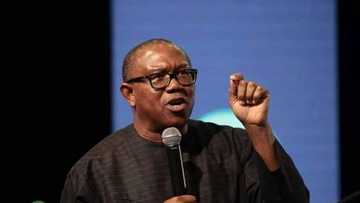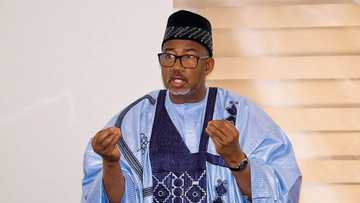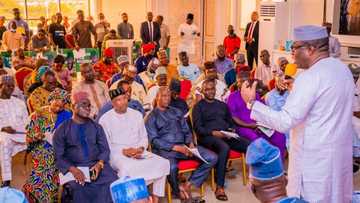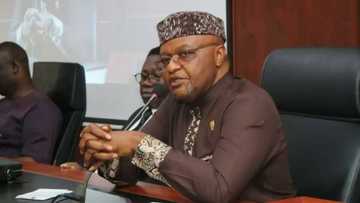Why and How Nigeria's Capital was Moved from Lagos to Abuja 31 Years ago
Up until December 11, 1991, the most populous city in Africa, Lagos state served as the capital of Nigeria. However, Nigeria's chief commercial, maritime nerve center and economic engine room would lose that title to the latest kid on the bloc, Abuja the next day.
PAY ATTENTION: Click “See First” under the “Following” tab to see Legit.ng News on your Facebook News Feed!
In this article, Legit.ng seeks to demystify (for those not well versed) as well as revisit (to refresh the memories) the real reason Nigeria's capital was relocated and why.

Source: UGC
How Abuja became Nigeria's capital
It was Nigeria's 4th Head of State Murtala Ramat Muhammed (dubbed Monty of the Midwest) who Midwest) who initiated the plan for the movement of Nigeria's capital from Lagos to Abuja.
The Kano-born general under his regime started the process by setting up a panel in August 1975.
PAY ATTENTION: Join Legit.ng Telegram channel! Never miss important updates!
The panel which was led by Justice Akinola Aguda was saddled with the responsibilities that include: advising if it was suitable for Lagos to retain its twin roles of being both state and federal capital; or if the capital was to move from Lagos.
The committee was also tasked with coming up with alternative suitable locations in the event that Lagos couldn't keep the dual status highlighted above, bearing in mind the need for the alternative locations to have easy access to and from every part of the country.
It was the recommendation of the committee that Lagos cannot hold the dual roles and that the Federal Capital Territory (FCT) be moved out of Eko.
Heeding the recommendation of the committee and having studied world capitals like Brasília (Brazil), Petersburg (Russia), Washington, D.C. (United States), among others, Abuja was settled for.
And in 1976, General Murtala Mohammed announced in a broadcast that Abuja would be the new capital of Nigeria and would undergo development to that effect.
An excerpt of his broadcast in 1976, culled by Dubawa, reads:
"The area is not within the control of any of the major ethnic groups in the country. We believe that the new capital created on such virgin lands, as suggested, will be for all Nigerians a symbol of their oneness and unity. The Federal Territory will belong to all Nigerians.”
However, Murtala was assassinated on 13 February 1976 at the prime age of 37 and consequently didn't see out the process.
General Ibrahim Badamasi Babangida on December 12, 1991, then formally moved Nigeria's seat of power from Lagos to Abuja, putting an end to a title that had been held by Lagos since 1914.
Why Abuja was picked to become Nigeria's capital
Abuja wasn't just picked out of the blues to be the country's FCT, several factors were put into consideration.
Lagos being the country's inherited capital after Nigeria gained independence in 1960 had some serious problems that brought a question mark on whether it was capable of assuming the roles of being a state and FCT.
Some problems Lagos had at that time (some still present) include overstretched infrastructure, intractable traffic, chronic housing shortages and over congestion. Other concerns were its intolerable living and working conditions as well as its severe environmental sanitation problems.
Key of the issues that made the relocation of the country's capital were security risks and neutrality.
Although Nigeria was not in any war with an international country, the civil war showed that the location might be susceptible to attack especially air and sea attacks. It was necessary to choose a location where the president who also doubles as the commander in chief of the armed forces could strategise and not be caught unaware in the eventuality of an attack.
On neutrality, Lagos can at that time - even now - be viewed as a land of the Yorubas even though there were persons from different tribes residents in it in large numbers.
And Abuja provides the solution need as it was sparsely dominated by any of the major tribes in Nigeria (Igbo, Yoruba and Hausa).
Years on, Abuja natives say they were wronged
With the choice of Abuja as the county's capital, its original and native occupants were displaced.
Dubawa however reports that committees were put in place to help the natives relocate and live comfortably.

Source: UGC
The aforementioned media stated that the government shouldered the old Abuja occupant's relocation expenses with a certain compensation rate for households and worship centres like churches and mosques.
This was declared and authorised in Decree No. 6 of 1979.
In a deal signed on October 10, 1977, it was agreed upon that the cost of relocating places of worship along with families was pegged at the sum of one million naira for the Niger, Plateau, and Kwara states.
But the ethnic group Gbagyi (Gwari) who were the original settlers in Abuja still somewhat feel under-compensated and cheat to this day.
One of the aggrieved old inhabitants, Chawandana Kauran from the district of Kubwa, told Aljazeera exclusively that he still can't forget the ill-treatment meted to them years ago when they were being dispersed.
“We had farms and tended to our farms every morning without issues. We were not consulted. Thousands of families used to be there. It was our ancestral land.
"Government people came to us and told us we were moving. Then the next morning military trucks came to us and brought us here.
“To this day, I will never forget how they treated us. They did that to us because they knew we had no one to turn to. We went to court and our case has not been heard yet. More than 30 years and we are still waiting,'' he lamented.
Source: Legit.ng







